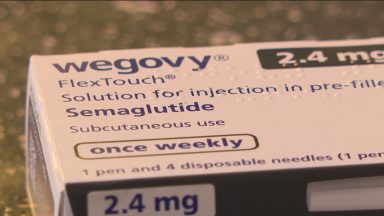Overcrowding and staff shortages are highlighted at a Scottish prison as a new report “paints a sobering picture” of the issues.
His Majesty’s Inspectorate of Prisons for Scotland (HMIPS) has published its inspection report on HMP Glenochil in Clackmannanshire.
The inspection found many areas of positive practice but ultimately, serious concerns were raised about overcrowding and the treatment of vulnerable prisoners.
The report says it “paints a sobering picture of a prison struggling under the crippling effects of overcrowding and staff shortages.”
It continues: “Conditions continue to breach minimum standards of human dignity with 244 men sharing cells built for one. Decency has been another casualty with concerns about food hygiene and cleanliness.
“There is barely any aspect of prison life which is not affected by overpopulation.”
HM Chief Inspector of Prisons for Scotland, Sara Snell, said the report exposes “unacceptable conditions”.
She said: “This inspection highlights the dedication of staff providing care and support under difficult circumstances, particularly in health and social services. It also exposes unacceptable conditions resulting from overcrowding, poor food hygiene, and limited opportunities for those deprived of their liberty.
“Prisons exist to keep the public safe and that duty extends far beyond ensuring no one escapes. Staff must have the time and support to engage with prisoners, encouraging them to learn new skills, prove their suitability for parole, address basic needs and support a return to society as contributing citizens. This was not happening at Glenochil for too many prisoners.”
The report follows an inspection conducted in February 2025 in partnership with Health Improvement Scotland (HIS), the Care Inspectorate (CI) and Education Scotland (ES).
The report highlighted that the healthcare team demonstrated strong and compassionate leadership in caring for an ageing and often infirm prison population.
Inspectors also commended staff for their commitment and compassion to men who were ill, disabled or dying.
However, it noted the prison had experienced significant staff shortages, leading to an inconsistent and unpredictable regime.
Prisoners spend most of their time in their cells, and Personal Officers lack the time and support to build constructive relationships with prisoners.
Record keeping in relation to suicide prevention procedures was inconsistent and there was limited staff awareness of anti-bullying policies.
The report said that a particular concern was the high number of prisoners being managed under the Management of Offenders at Risk due to any Substance procedures.
In December 2024 alone, 19 prisoners required emergency hospitalisation, which the report said reflected “the serious risk posed by illicit substances”.
Ms Snell continued: “The improvements made so far are fragile and must be sustained through strong leadership and continued investment in staff, safety and decency. We need a national conversation on the appropriateness of prison for people who are exceedingly frail, terminally ill and assessed as no longer posing a threat to society.
“There are different options for older prisoners with complex health needs, including dementia, who can surely be more appropriately cared for in potentially less expensive and lower security settings.”
The HMIPS has requested that the prison ask the Scottish Prison Service to advise how they will deliver the necessary improvements.
The report describes 77 such desired outcomes, including that prisoners in situations of vulnerability receive appropriate care across the board, prisoners receive reliable and equitable access to a full day of activities during the week and at weekends and improvements to food and hygiene.
It has also been requested that prisoners have confidence in the complaint system, as there was evidence of the system not functioning as it should.
A Scottish Government spokesperson said: “We welcome the Inspectorate’s report into HMP Glenochil, which highlights areas of good practice, particularly around enhanced visiting opportunities and the health care for prisoners.
“There are recommendations for improvement, particularly in relation to the cleanliness and hygiene of the prison, and the Scottish Prison Service has implemented processes to address these issues since the inspection took place in February.
“We have taken a number of actions to tackle the rising prison population, including maximising the estate, increased investment in community justice, more use of Home Detention Curfew and introducing regulations for the early release of short-term prisoners – with stringent safeguards in place to protect public safety.”
A Scottish Prison Service spokesperson said: “We welcome this report, which highlights many areas of good practice, including the use of peer mentors, the National Demolition Group vocational training, additional access for visitors travelling long distances, and the dads’ group, which also supports those important family relationships.
“There has been a significant amount of work already undertaken to address issues raised in the report, including new menus, new kitchen equipment purchased, and a strong focus on cleanliness, litter removal, and a painting programme.”
Follow STV News on WhatsApp
Scan the QR code on your mobile device for all the latest news from around the country




























